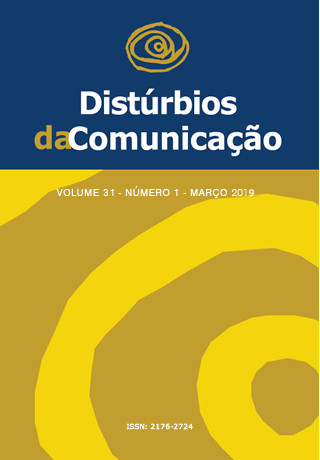Psychism and language in the interdisciplinary clinic with young children
DOI:
https://doi.org/10.23925/2176-2724.2019v31i1p54-68Keywords:
Child development, Language, Psychoanalysis, Speech, Language and Hearing ScienceAbstract
Purpose: To analyze the presence of psychic risk in a group of young children complaining of language delay in an interdisciplinary perspective between psychoanalysis and enunciative theory of language, comparing the clinical analysis from different evaluation instruments. Method: Qualitative study of five cases in the age group from two years to four years and four months, with a complaint of delay in language acquisition. The psychic diagnosis was performed by the psychologist through the IRDI-questionnaire, the Childhood Autism Rating Scale (CARS) and the Psychoanalytic Assessment of the Three Years (AP3), and the language evaluation was performed by the speech-language therapist through video analysis, based on the enunciative principles. Results: The psychological assessments, AP3 and IRDI-questionnaire, showed that all five cases had or has psychic risk, but psychoanalytic assessment was more sensitive to different types of risk. CARS has detected a case of autistic disorder. The enunciative view of language evaluation allowed us to observe the relationship between psychicological aspects and language acquisition, especially when considering the process of semantization of the language and the principle of intersubjectivity. Early intervention by the speech therapist can reduce psychicological risk when crossed by psychoanalytic and enunciative theory. Conclusion: The psychoanalytic and enunciative theories were complementary in the detection of psychic risk and language evaluation among cases of delayed language acquisition, demonstrating that their instruments were effective in the diagnostic differentiation.Downloads
Downloads
Published
Issue
Section
License
Copyright (c) 2019 Tamires Dias dos Santos, Ana Paula Ramos de Souza, Angélica Dotto Londero, Fernanda Prada Machado, Maria Claudia Cunha

This work is licensed under a Creative Commons Attribution 4.0 International License.









